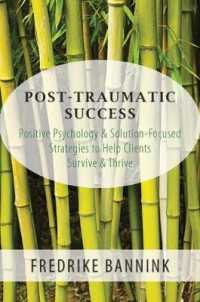Full Description
This current and comprehensive handbook will guide educators, students, and clinicians in developing the awareness, knowledge, and skills necessary to work effectively with LGBTQI+ populations. Twenty-five chapters written by experts in the field provide direction for working with clients in an authentic, ethical, and affirmative manner that is tailored to their individual strengths, needs, and identity.
The book is divided into four sections, which explore the science behind gender and affectional orientation; developmental issues across the life span and treatment issues; the specialized needs of nine distinct populations; and the intersectionality of ethnicity and overlapping identities, the role of religion, and counselor advocacy. To further a deeper understanding of the content, each chapter contains an "Awareness of Attitudes and Beliefs Self-Check," a case narrative relating to the material covered, questions for discussion, and a list of online resources. The book concludes with an extensive glossary of terms, both preferred and problematic, which counselors working with these communities should understand and use appropriately.
Contents
Preface
About the Editors
About the Contributors
Acknowledgments
Section I: Foundations
Developing Competence in Working With LGBTQI+ Communities: Awareness, Knowledge, Skills, and Action
The Science of Gender and Affectional Orientation
Section II: Counseling Considerations and Counseling Strategies
Developmental Issues for LGBTQI+ People
Growing Up LGBTQI+: The Importance of Developmental Conceptualizations
LGBTQI+ Youth Development
LGBTQI+ Persons in Adulthood
Identity Development, Coming Out, and Family Adjustment
Physical and Mental Health Challenges Found in the LGBTQI+ Population
Counseling Treatment Issues With LGBTQI+ Clients
Disaffirming Therapy: The Ascent and Descent of Sexual Orientation Change Efforts
Evidence-Based Practice for Counseling the LGBTQI+ Population
Affirmative, Strengths-Based Counseling With LGBTQI+ People
Section III: Specialized Populations
Counseling Lesbian Clients
Counseling Gay Male Clients
Counseling Bisexual/Pansexual/Polysexual Clients
Counseling Transgender Clients
Counseling Queer and Genderqueer Clients
Counseling Clients Questioning Their Affectional Orientation
Counseling Intersex Clients
Counseling Asexual Clients
Counseling Two-Spirit Clients
Section IV: Emerging Issues
The Role of Ethnicity
Counseling an LGBTQI+ Person of Color
Counseling LGBTQI+ Immigrants
The Role of Religion
The Role of Religion and Spirituality in Counseling the LGBTQI+ Client
The GRACE Model of Counseling: Navigating Intersections of Affectional Orientation and Christian Spirituality
Working With LGBTQI+ Clients Who Have Experienced Religious and Spiritual Abuse Using a Trauma-Informed Approach
Counselor Advocacy
Becoming an Ally: Personal, Clinical, and School-Based Social Justice Interventions
Glossary of Terms








